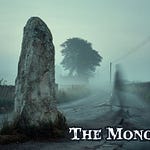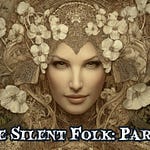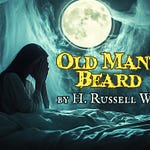The Fall Of The House Of Usher
- Classic Ghost Stories Podcast has done a Poe story before: [The Tell-Tale Heart (Episode 12)] and that was fine, but the Fall of the House of Usher is, in my humble opinion, finer.
Poe was an American writer born in 1809 in Boston who died aged only forty in Baltimore in 1849. He is one of the best-known American writers of his generation and famed all over the world for his Gothic and macabre tales. It was long overdue that we did another of his stories
The Fall of the House of Usher was published in 1839, when grave-robbing was still a thing. He makes a play on the word 'house' which can mean both a lineage and a building. This is a rhetorical usage known as a syllepsis.
The story is a fine Gothic thing. We have dismal setting with the rotting trees and the stagnant tarn (which is a small lake) the gloomy castle, the sickly and neurotic hero, the storm and generally dreadful weather, the mysterious and sinister chatelaine, Madeline. It is quasi-Medieval also, though not set in Medieval times, it might as well be and at the end they read from some Arthurian legend to make even more Medieval.
The remoteness of the house, the lack of modern communications (even for the 1830s), the terrible weather and the vague dream time of no specific location and no specific time trap us in the legend. The house haunts the characters as much as their wraith-like dream forms haunt its halls. Roderick never leaves the house and I doubt Madeline of Usher was much of a gad-about either.
Poe never says anything clearly in a few words when he can draw it out over several obscure sentences with multiple clauses and hints rather than statements. We love him for it, indeed that's why we read him.
Old Roderick decides to entomb Madeline in the deep dungeon, because it is hinted that the medical men would seek to dig her up and use her for research, given the obscurity of her illness. This was a thing in Poe's days or just before.
The hint of the blush on dead Madeline's face is suggestive that she may be a vampire, and Poe, I think was encouraging this, but it is in fact, as it later transpires in a nice twist (nice?) that poor Madeline was not in fact dead, and furthermore, her brother suspected this.
Poe's stories are populated by the deeply neurotic and this, for me, is his masterpiece. I love the Gothic prolixity of it, I love the funereal sombreness and I am struck how much influence Poe had on Lovecraft in his vocabulary. Now, it may be an American usage, but, outside these two, I've never come across the word "litten" for "lit" as in red-litten, for red-lit, and my autocorrect dislikes it also. Also reminiscent of Lovecraft, is the long list of obscure books, mostly not in English; a favourite device of the Cthulhu Mythos.
What Poe does wonderfully in this story, I think, is identify the building with the family themselves and make the house a living thing. The fortunes of the House of Usher, as he says, is reflected in both the fabric of the ancient castle and the health of the living line. When the people die, the house dies also.
Shirley Jackson does this in her story, The Visit (Episode 52)
The co-mingling of story and actuality happens in the reading of the Arthurian legend where the breaking in of Ethelred, has its counterpart in the breaking out of the dying Madeline. In a sense this also mirrors the identity of the living Ushers with the symbol of the ancient building.
The purpose of the narrator is merely to give us a window into the goings on, for he does nothing active in the story. I love the image of the blood-red moon rising over the tarn at the end as the house (and its inhabitants) fall into the dark waters. We are reminded that the first image (nearly) is of the House of Usher reflected upside down in the waters of the tarn, and now at the end the tarn swallows it up forever.
Music
Some Come Back, Witch Phase 4, and Powers of Darkness by The Heartwood Institute. Tell Jonathan I sent you!














Share this post